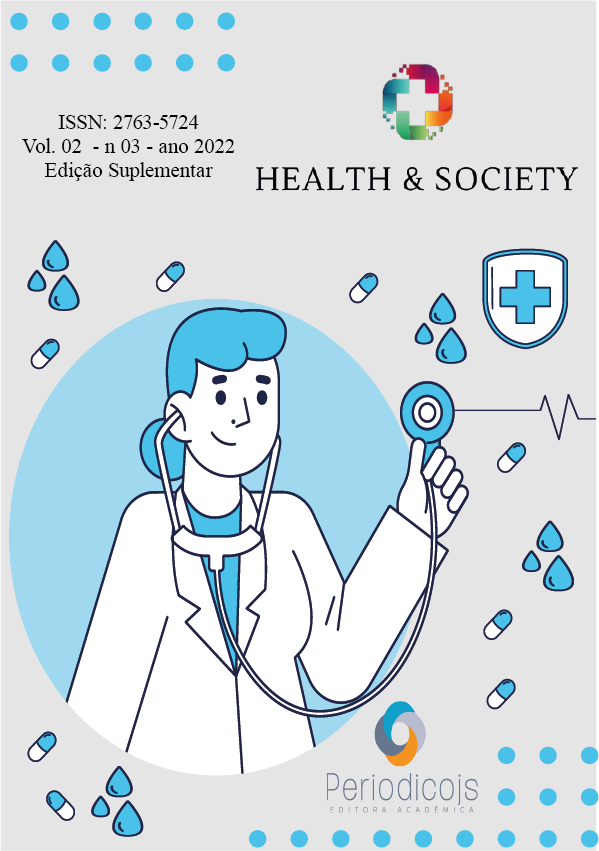Resumo
Introduction: One of the most frequent complaints of women during the gestational period is vulvovaginitis, which are infections that affect the female genitalia. When you have contact with an infectious agent, such as microorganisms, parasites, bacteria, viruses or fungi. Therefore, it is of fundamental importance that the nursing professional has knowledge about these infections, and that treatment strategies are carried out according to the clinical needs of the patient. Objective: To identify the main guidelines on treatment for vulvovaginitis during pregnancy. Methodology: The present study is an integrative literature review, carried out through a bibliographic survey in scientific databases of electronic libraries: Latin American and Caribbean Literature on Health Sciences (LILACS), Bases Data on Nursing (BDENF) and Scientific Electronic Library Online (SCIELO), where the eligibility criteria defined for sample selection and composing research results were applied. Results and Discussions: From the analysis of the literature, it was shown that most cases of vulvovaginitis are associated with multiple or new sexual partners, as well as the non-use of condoms and even vaginal douches. Vaginal douches can cause an imbalance in the PH and consequently in the vaginal bacterial flora, leaving the region more susceptible to infections. In this process of vaginal infections during pregnancy, the nursing professional plays an essential role in the diagnosis and treatment of these pregnant women. During prenatal consultations, the nurse may be questioning the pregnant woman about symptoms and signs suggestive of sexual infection, because the earlier the diagnosis, the better the treatment response. Conclusion: Health education is the main method of guidance for pregnant women. Always in prenatal consultations, the same should be oriented as to risk factors and prevention methods, always oriented to adherence to eating habits, hygiene of the intimate region and practice of physical activities, because the best way of treating vulvovaginitis is prevention.
Referências
BEZERRA, Dallila Estefâne Rodrigues; BELÉM, Gizelle Guida; GONTIJO, Erica Eugênio Lourenço. Candidíase vulvovaginal em gestantes: uma revisão integrativa da literatura. E-Acadêmica, v. 3, n. 2, p. e2232153-e2232153, 2022.
CONTRI, Monalisa Lóren et al. A importância do teste papanicolau como prevenção do câncer cervical e fatores de riscos relacionados a ausência do exame em gestantes. Brazilian Journal of Development, v. 7, n. 10, p. 98308-98323, 2021.
COSTENARO, Regina Gema Santini et al. Perfil comparativo de puérperas adolescentes e adultas de risco habitual. Brazilian Journal of Development, v. 7, n. 1, p. 11240-11251, 2021.
FERNANDES, MARIA JESSICA DA SILVA; PINHO, VITÓRIA PEREIRA; DE LIMA, LIENE RIBEIRO. CANDIDÍASE VULVOVAGINAL NO PERÍODO GESTACIONAL: UMA ABORDAGEM TEÓRICA. Encontro de Extensão, Docência e Iniciação Científica (EEDIC), v. 7, 2020.
ESPINHEIRO, Roberto et al. Aspectos da microbiota vaginal e a relação com a candidíase em mulheres gestantes: uma revisão de literatura. Research, Society and Development, v. 1
FRANCISCO, Adriana Amorim et al. Relação entre vulvovaginite pré-natal e laceração perineal relacionada ao parto. Acta Paulista de Enfermagem, v. 34, 2021.
HOLANDA, Ana Karollaine da Silva et al. Vulvovaginites durante a gestação-importância do tratamento imediato. Brazilian Journal of Development, v. 6, n. 7, p. 46448-46455, 2020.
TSUHA, Andressa Akeime Yamakawa et al. O cuidado com a mulher no ciclo gravídico-puerperal. Perspectivas Experimentais e Clínicas, Inovações Biomédicas e Educação em Saúde (PECIBES) ISSN-2594-9888, v. 5, n. 2, p. 71-71, 2019.
MOURA SOARES, Fernanda; PEREIRA, Rafael Monteiro. ABORDAGEM ATUAL DA CANDIDÍASE VULVOVAGINAL NO PERÍODO GRAVÍDICO. Revista Baiana de Saúde Pública, v. 42, n. 1, 2018.
MELO BARBOSA, Nathállia Resende et al. Perfil de utilização e de prescrição do miconazol vaginal em uma unidade básica de saúde. Revista Contexto & Saúde, v. 22, n. 45, p. e12110-e12110, 2022.
PEREIRA, Flávia Leandra de Oliveira. Prevalência de Vulvovaginites em mulheres grávidas: Protocolo Revisão de Escopo. Trabalho de Conclusão de Curso. Universidade Federal do Rio Grande do Norte. 2022.
SILVA SANTOS, Crislene; BISPO, Irailde Neves; DE SOUZA, Otaciana Almeida. Candidíase Vulvovaginal Recorrente: O papel do enfermeiro. Revista Ibero-Americana de Humanidades, Ciências e Educação, v. 7, n. 3, p. 470-483, 2021.
SOUZA CARMONA, Bianca Dandara Araújo; RODRIGUES, Gabriela Meira. CANDIDÍASE: A IMPORTÂNCIA DO PROFISSIONAL DA SAÚDE EM PROL DA PREVENÇÃO. Revista Liberum accessum, v. 12, n. 1, p. 20-26, 2021.
SILVA, Flávia Juliane Nascimento. Fatores de virulência de candidíase em mulheres grávidas: uma revisão de literatura. Trabalho de Conclusão de Curso. Universidade Federal do Rio Grande do Norte. 2021.
MELO BARBOSA, Nathállia Resende et al. Perfil de utilização e de prescrição do miconazol vaginal em uma unidade básica de saúde. Revista Contexto & Saúde, v. 22, n. 45, p. e12110-e12110, 2022.

Este trabalho está licenciado sob uma licença Creative Commons Attribution 4.0 International License.
Copyright (c) 2022 Emmir Adélia de Paula Sousa, Anne Caroline de Souza, Macerlane de Lira Silva, Thárcio Ruston de Oliveira Braga





